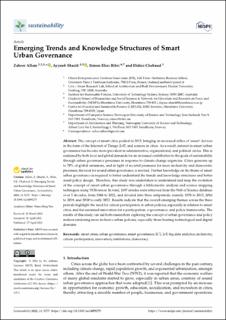| dc.description.abstract | The concept of smart cities peaked in 2015, bringing an increased influx of ‘smart’ devices in the form of the Internet of Things (IoT) and sensors in cities. As a result, interest in smart urban governance has become more prevalent in administrative, organisational, and political circles. This is sustained by both local and global demands for an increased contribution to the goals of sustainability through urban governance processes in response to climate change urgencies. Cities generate up to 70% of global emissions, and in light of societal pressures for more inclusivity and democratic processes, the need for sound urban governance is merited. Further knowledge on the theme of smart urban governance is required to better understand the trends and knowledge structures and better assist policy design. Therefore, this study was undertaken to understand and map the evolution of the concept of smart urban governance through a bibliometric analysis and science mapping techniques using VOSviewer. In total, 1897 articles were retrieved from the Web of Science database over 5 decades, from 1968 to 2021, and divided into three subperiods, namely 1978 to 2015, 2016 to 2019, and 2020 to early 2022. Results indicate that the overall emerging themes across the three periods highlight the need for citizen participation in urban policies, especially in relation to smart cities, and for sustained innovation for e-participation, e-governance, and policy frameworks. The results of this study can aid both researchers exploring the concept of urban governance and policy makers rendering more inclusive urban policies, especially those hosting technological and digital domains. | en_US |

